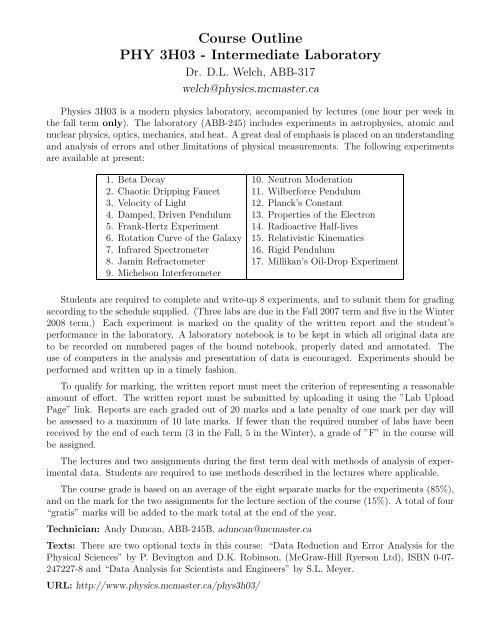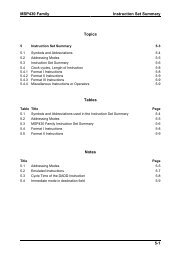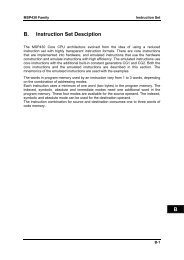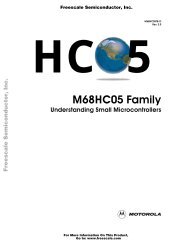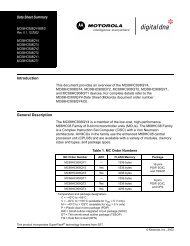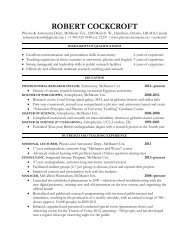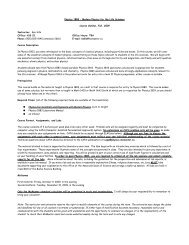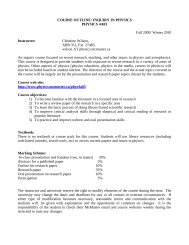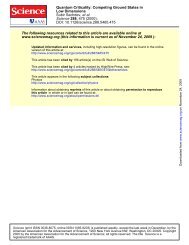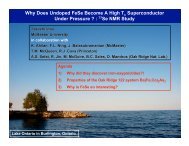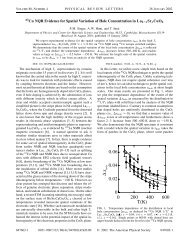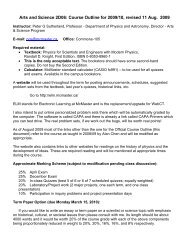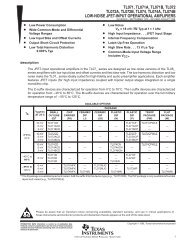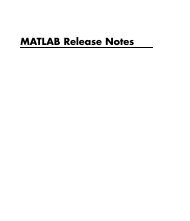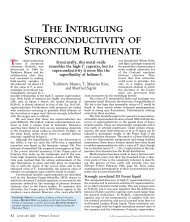Course Outline PHY 3H03 - Intermediate Laboratory - McMaster ...
Course Outline PHY 3H03 - Intermediate Laboratory - McMaster ...
Course Outline PHY 3H03 - Intermediate Laboratory - McMaster ...
Create successful ePaper yourself
Turn your PDF publications into a flip-book with our unique Google optimized e-Paper software.
<strong>Course</strong> <strong>Outline</strong><br />
<strong>PHY</strong> <strong>3H03</strong> - <strong>Intermediate</strong> <strong>Laboratory</strong><br />
Dr. D.L. Welch, ABB-317<br />
welch@physics.mcmaster.ca<br />
Physics <strong>3H03</strong> is a modern physics laboratory, accompanied by lectures (one hour per week in<br />
the fall term only). The laboratory (ABB-245) includes experiments in astrophysics, atomic and<br />
nuclear physics, optics, mechanics, and heat. A great deal of emphasis is placed on an understanding<br />
and analysis of errors and other limitations of physical measurements. The following experiments<br />
are available at present:<br />
1. Beta Decay 10. Neutron Moderation<br />
2. Chaotic Dripping Faucet 11. Wilberforce Pendulum<br />
3. Velocity of Light 12. Planck’s Constant<br />
4. Damped, Driven Pendulum 13. Properties of the Electron<br />
5. Frank-Hertz Experiment 14. Radioactive Half-lives<br />
6. Rotation Curve of the Galaxy 15. Relativistic Kinematics<br />
7. Infrared Spectrometer 16. Rigid Pendulum<br />
8. Jamin Refractometer 17. Millikan’s Oil-Drop Experiment<br />
9. Michelson Interferometer<br />
Students are required to complete and write-up 8 experiments, and to submit them for grading<br />
according to the schedule supplied. (Three labs are due in the Fall 2007 term and five in the Winter<br />
2008 term.) Each experiment is marked on the quality of the written report and the student’s<br />
performance in the laboratory. A laboratory notebook is to be kept in which all original data are<br />
to be recorded on numbered pages of the bound notebook, properly dated and annotated. The<br />
use of computers in the analysis and presentation of data is encouraged. Experiments should be<br />
performed and written up in a timely fashion.<br />
To qualify for marking, the written report must meet the criterion of representing a reasonable<br />
amount of effort. The written report must be submitted by uploading it using the ”Lab Upload<br />
Page” link. Reports are each graded out of 20 marks and a late penalty of one mark per day will<br />
be assessed to a maximum of 10 late marks. If fewer than the required number of labs have been<br />
received by the end of each term (3 in the Fall, 5 in the Winter), a grade of ”F” in the course will<br />
be assigned.<br />
The lectures and two assignments during the first term deal with methods of analysis of experimental<br />
data. Students are required to use methods described in the lectures where applicable.<br />
The course grade is based on an average of the eight separate marks for the experiments (85%),<br />
and on the mark for the two assignments for the lecture section of the course (15%). A total of four<br />
“gratis” marks will be added to the mark total at the end of the year.<br />
Technician: Andy Duncan, ABB-245B, aduncan@mcmaster.ca<br />
Texts: There are two optional texts in this course: “Data Reduction and Error Analysis for the<br />
Physical Sciences” by P. Bevington and D.K. Robinson, (McGraw-Hill Ryerson Ltd), ISBN 0-07-<br />
247227-8 and “Data Analysis for Scientists and Engineers” by S.L. Meyer.<br />
URL: http://www.physics.mcmaster.ca/phys3h03/
Legal Copy: You are expected to exhibit honesty and use ethical behaviour in all aspects of the<br />
learning process. Academic credentials you earn are rooted in principles of honesty and academic<br />
integrity. Academic dishonesty is to knowingly act or fail to act in a way that results or could result<br />
in unearned academic credit or advantage. This behaviour can result in serious consequences, e.g.<br />
the grade of zero on an assignment, loss of credit with a notation on the transcript (notation reads:<br />
“Grade of F assigned for academic dishonesty”), and/or suspension or expulsion from the university.<br />
It is your responsibility to understand what constitutes academic dishonesty. For information on<br />
the various types of academic dishonesty please refer to the Academic Integrity Policy, located at:<br />
http://www.mcmaster.ca/academicintegrity<br />
• 1. Plagiarism, e.g. the submission of work that is not one’s own or for which credit has<br />
been obtained. In this course, examples would include copying lab reports written by other<br />
students or written assignments.<br />
• 2. Improper collaboration in group work.


